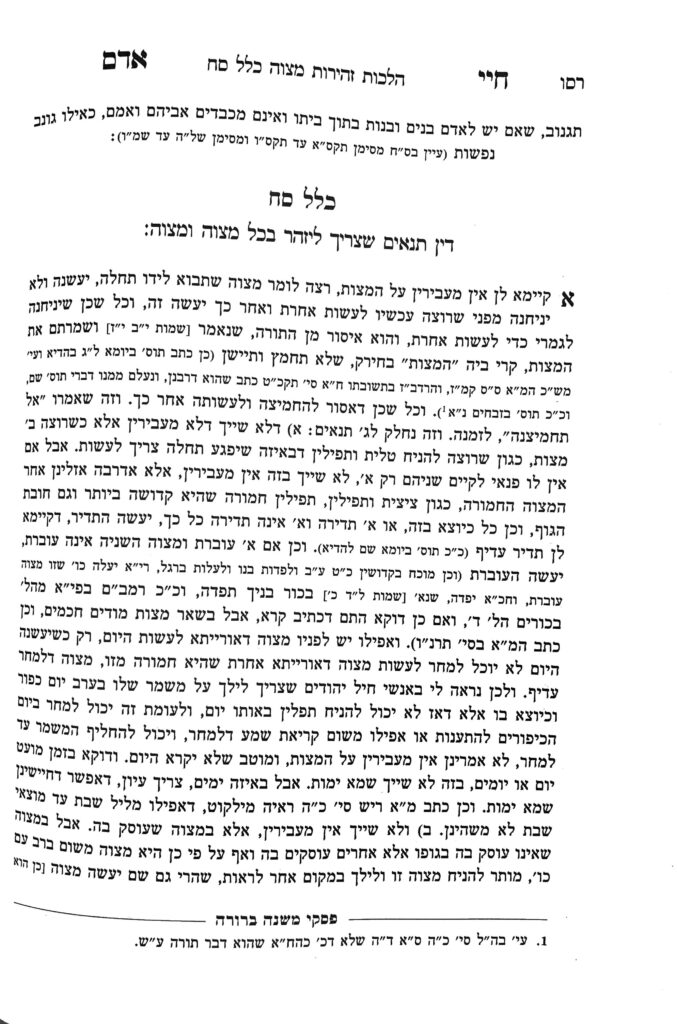We are continuing in siman 1. We left off discussing the third limitation to ain ma’avirin, namely, if by waiting a day or two, one will be able to perform the mitzvah in a better way, ain ma’avirin potentially will not apply. We learned that the Chayei Adam began by writing that one should wait, but writes that the Sefer Chassidim holds one should not wait.
In the Nishmas Adam, he concludes that the source for the opinion to wait is the Terumas Hadeshen, but that the Terumas Hadeshen must not have seen the opinion of the Sefer Chassidim. Had the Terumas Hadeshen seen the Sefer Chassidim, he would have paskened like it. Therefore, the Nishmas Adam concludes that the halacha is in accordance with the Sefer Chassidim and one should not wait to perform the mitzvah. This is also the opinion of the Bach and Gra. Thus, regarding the example discussed yesterday, one should not wait until Motzei Shabbos to perform kiddush levana, but should perform it on the first night possible.
Practically, it is a machlokes which opinion one should follow. We learned yesterday that the Shulchan Aruch holds one should wait.
The Shaarei Teshuva, in siman 651, regarding the halachos of esrog, presents the following question. If a person has a kosher esrog with them, but could wait a few hours to gain access to a more mehudar esrog, the Teshuvos Beis Yaakov holds that a person should wait for the better esrog. Similarly, in Shaarei Teshuva siman 673, regarding hilchos Chanukah, he brings a case of a person who generally lights with olive oil, but comes home to find that he is out of oil. He writes that it is preferable to wait for olive oil, rather than to light immediately with wax candles. These pesakim seem to follow the Shulchan Aruch’s hachraah that it is preferable to wait in order to perform a mitzvah in a better fashion rather than to perform it immediately in a lesser way.
On the other hand, we have learned from the Radvaz that if a person has an opportunity to daven now or daven later where they will fulfill more chamur mitzvos (the case on a person incarcerated; see shiur 1373), they should daven now rather than wait. The Avnei Nezer is of this opinion as well. The Maharsham brings a proof from Tosfos in Temurah to this opinion as well.
We see there are opinions on both sides, so whichever a person follows they have what to rely on. The Mishnah Berurah seems to indicate that he does not have a final opinion either way. The minhag regarding kiddush levana is to wait until Motzei Shabbos.
In the Sefer Nasiach Bechukecha, which is a sefer all about our Klal, the author brings other ideas related to this point which are not addressed by the Chayei Adam. Be’ezras Hashem, we will discuss those tomorrow.
Summary
There are three limitations to the application of ain ma’avirin:
-
If one is only able to fulfill one of the mitzvos
-
If the person is not an active participant in the current mitzvah, but only a spectator. Although there is a concept of b’rov am, the concept of ain ma’avirin does not apply.
-
If one can perform the mitzvah in a better way by waiting until a later time.
-
Although the Chayei Adam paskens with this limitation, practically, it is a machlokes poskim whether we apply it or not. One has what to rely on both if they follow this limitation and if they do not.
-
Regarding kiddush levana, the minhag has become to follow this limitation, and to wait until Motzei Shabbos to perform kiddush levana.



